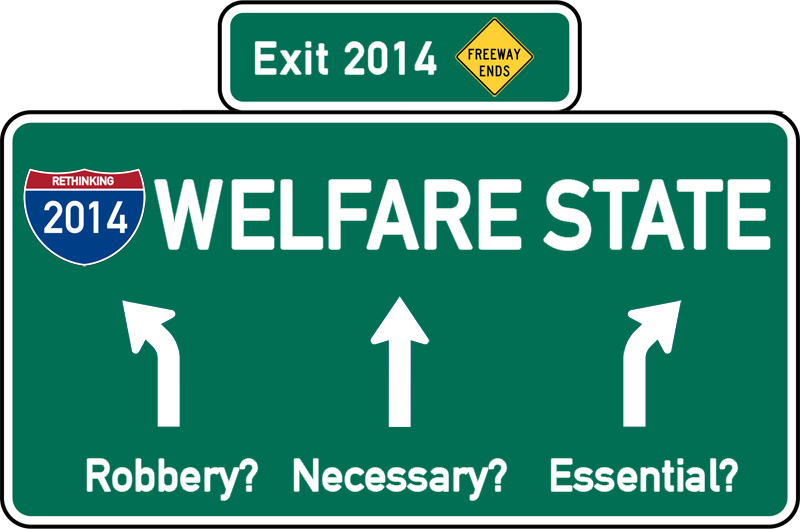What is the welfare state? Highway robbery? A necessary evil? A good idea? All three perspectives are out there and deserve addressing.

1. Highway robbery
This is the libertarian position or the liberal individualistic position. (There are also liberal, non-individualistic positions.) Every individual is responsible for his or her own life and no one has the right to demand others to resolve their problems, with the exception of reasons of friendship and family or because they are willing to do so voluntarily out of charity or altruism. In addition, a generalized welfare program involves increasing costs and diminishes economic growth, which jeopardizes everyone’s well being.
2. It’s a necessary evil
The welfare state does indeed diminish economic efficiency, because it increases costs (in the form of taxes) and it reduces incentives to produce, work, invest and save. Yet a capitalist system without redistributive mechanisms and a social safety net would lead to excessive income inequality and this would damage equality and create instability. Therefore, the welfare state will always be a compromise between efficiency (a reduced safety net) and equality (a broader safety net).
It will therefore be necessary and inevitably unstable. Another version of this perspective says the following: Efficiency is good, but this assumes that some will lose, at least in the short run, which makes investing in social protection a smart thing, because it is also a means to “win votes” necessary to pass pro-efficiency measures.
3. The welfare state is a good idea when there are market failures
There are certain risks that an individual can assume on his or her own. For example, in response to the fear that his or her home could burn down, an individual can purchase an insurance policy. But there are other risks that an individual or family cannot assume, because they are too expensive and because private insurance companies don’t offer the corresponding coverage. A private company would never, for example, offer unemployment coverage; the likelihood is too high that either the employee or the employer would be tempted to manipulate the situation in order to pay for circumstances that are not authentically of unemployment.
It is also possible that the costs of a particular situation be way above what an individual can pay. For example, medical insurance that covers heart transplant or Alzheimer’s would most likely be too costly for the majority of families. There are also situations with externalities that affect everyone, for example in the case of mass vaccination campaigns. In this case, the risk isn’t for one individual, but rather for the collective. If someone doesn’t want to or cannot pay for a vaccination, he or she puts other individuals’ health at risk.
The experience of the last few decades
What we have been experiencing over the last few decades is the development of the welfare state that justifies the second and third perspectives. These approaches involve an ongoing risk of potential system failure because of an excessive increase in coverage and thus, a corresponding increase in costs, with a negative impact on efficiency (lower economic growth which jeopardizes everyone).
Yet equality is also a victim. When we implement policies that do not take into account how they can lead to a person’s moral deterioration, we are depriving them of their right, and their duty, to take care of themselves and ensure their own life and future.


